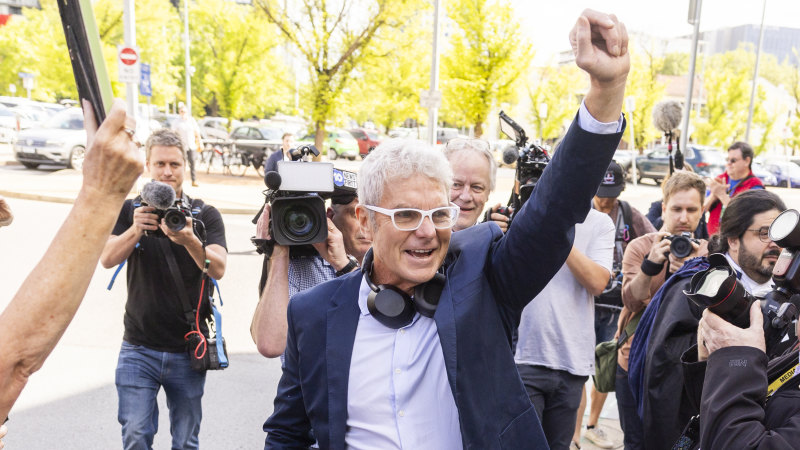Defence whistleblower had duty to disobey orders, lawyer says

Save articles for later
Add articles to your saved list and come back to them any time.
A former military lawyer turned whistleblower who disclosed information on alleged war crimes against his defence obligation had a higher duty to act in the public interest, his lawyer has told a Supreme Court judge, as the attorney-general warned his intervention in the case could set a dangerous precedent.
Stephen Odgers, SC, said his client David McBride, who is due to face a jury on several charges on Thursday, admitted to breaching orders not to disclose documents to journalists but said a Defence Force member’s obligation to uphold their duty sometimes meant disobeying orders.
Defence whistleblower David McBride – arriving at the ACT Supreme Court in Canberra on Monday – has been charged with disclosing confidential information to journalists.Credit: Alex Ellinghausen
“Was he acting in the course of his duty?” Odgers asked during a pretrial argument on Monday about how the concept of duty can be framed to the jury. “We say it doesn’t take long to appreciate that sometimes duties can conflict.
“If a soldier is confronted by enemy combatants who are surrounded by young children, there is, on one hand, a duty to remove the threat, there is also a duty to avoid [the loss] of civilian life.”
McBride, who arrived to a large crowd at the court complex on Monday morning, is facing five charges relating to the disclosure of classified documents between 2013 and 2017, including theft of Commonwealth property and breaching the Defence Act.
Moving through the crowd of more than 100 supporters with his support dog Jake by his side, the former army lawyer whose disclosures helped unearth allegations of Australian special forces committing war crimes in Afghanistan, held a fist in the air before addressing the crowd at the entrance of the court.
McBride’s barrister said his client breached orders but upheld his duty.Credit: Alex Ellinghausen
A jury is expected to be empanelled on Thursday after days of legal arguments that include an application by lawyers acting for Attorney-General Mark Dreyfus.
Greens senator David Shoebridge moved a motion in the Senate condemning the case on Monday morning, but Labor and the Coalition did not support him.
Dreyfus told the lower house that if he intervened in a prosecution as a result of political pressure, it “could have a range of far-reaching consequences”.
Attorney-General Mark Dreyfus.Credit: Alex Ellinghausen
“It could call into question the attorney-general’s motives. It could politicise the prosecution process, it could undermine the independence of the Director of Public Prosecutions,” he said, warning that the surrounding political commentary was inappropriate days before a jury was selected.
“It is vital to the administration of justice in Australia, that the prosecution process is and is seen to be largely independent of the political arena, and we should all be thankful for that.”
On Monday, Crown prosecutor Patricia McDonald, SC, told Justice David Mossop that McBride’s alleged offending arose after he breached his duty not to disclose the documents, adding that he shared information he wasn’t authorised to share and which had only come to his knowledge by virtue of being a Defence Force member.
She said that, as a military lawyer, McBride’s client was the Commonwealth and the rules required a solicitor not to publish information confidential to their client. She added that a core duty of a member of the armed forces was to follow orders.
“The defence’s submission is duty includes advancing the public interest. Such a duty is not recognised by any section of the Defence Act or Defence Force Discipline Act,” she said.
Odgers said while the breach of those duties could lead to disciplinary action under military rules, they didn’t rightly translate to criminal charges and read from a statement by Australian Defence Force Academy associate professor Stephen Coleman that upholding duty and orders could be separate things.
McBride arrived at the ACT Supreme Court with his therapy dog Jake.Credit: Alex Ellinghausen
“That what was done in the public interest, even though in breach of orders … in my respectful position, is not in breach of duty for the purposes of a criminal offence,” Odgers said.
“If a duty is not to be found there, where is it to be found? It is to be found essentially reflected in the oath of allegiance that a member of the Defence Force makes when he promises to well and truly serve the sovereign.
“We say the sovereign’s duty is to serve the public interest.”
With Paul Sakkal
Cut through the noise of federal politics with news, views and expert analysis from Jacqueline Maley. Subscribers can sign up to our weekly Inside Politics newsletter here.
Most Viewed in Politics
From our partners
Source: Read Full Article



